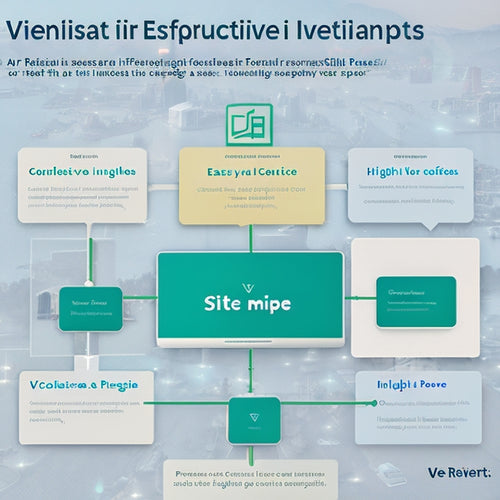Unlocking the Power of Internal Link Flow and Topical Authority With Topical Map
Share
This article explores the concept of unlocking the power of internal link flow and topical authority with the use of a topical map. Internal links play a crucial role in improving search engine optimization (SEO) and enhancing the user experience.
By strategically linking articles within a website, users can increase organic ranking and domain authority. The plugin discussed in this article offers a flow chart that helps visualize and manage the internal linking structure of articles, allowing users to track linked articles.
Additionally, the plugin provides a topical map, which enables users to enhance topical authority by linking subtopics to main topics. With a simple and quick installation process, users can save, edit, view, and manage links in the flow.
By leveraging internal links and topical authority, website owners can optimize their content for improved SEO and provide a seamless experience for their audience.
- Internal links are crucial for improving SEO and enhancing user experience.
- Strategically linking articles within a website can increase organic ranking and domain authority.
- The use of a plugin that offers a flow chart and topical map can help visualize and manage internal linking structure.
- Topical authority has a significant impact on organic rankings in SEO.
Benefits of Internal Links
Content with a higher number of internal links has been found to have increased rankings in search results and higher Domain Authority, indicating the benefits of internal links for SEO.
Internal links play a crucial role in improving user experience by allowing visitors to easily navigate through the website and find relevant content.
By linking related articles together, internal links provide a clear and logical flow of information, making it easier for users to explore different topics and delve deeper into the website's content.
Moreover, internal links help distribute link equity across the website, ensuring that all pages receive their fair share of authority.
This, in turn, can help increase website traffic as search engines recognize the interconnectedness of the content and rank the website higher in search results.
Topical Authority and SEO
The relationship between topical authority and search engine optimization (SEO) has been widely studied and is acknowledged to have a significant impact on organic rankings. To optimize internal linking for topical authority, it is crucial to understand the importance of topical relevance in SEO rankings.
Here are five strategies to consider:
-
Create a topical map: Visualize the relationship between main topics and subtopics to ensure a coherent internal linking structure.
-
Use descriptive anchor texts: Optimize anchor texts with relevant keywords to enhance the topical relevance of linked pages.
-
Link to authoritative sources: Linking to high-quality and authoritative sources within your content can boost your own topical authority.
-
Interlink relevant content: Link related articles together to create a network of topical relevance and improve user experience.
-
Regularly update and audit internal links: Regularly review and update internal links to ensure they remain relevant and support the overall topical authority of your website.
By implementing these strategies, you can unlock the power of internal link flow and topical authority, ultimately improving your search engine rankings.
Installation and Features
The installation process for the plugin is straightforward and quick, allowing users to easily access and utilize its visualization and management features for internal linking structures. Through a simple and quick installation, users can unlock the power of internal link flow and topical authority with the plugin's features.
By understanding the importance of internal link structure, users can optimize their internal linking for better SEO performance. The plugin provides a flow chart that helps track articles linked to each other, allowing users to visualize their internal link structure.
Additionally, the plugin offers a topical map, which links subtopics to main topics, and topical authority, a method to increase organic ranking without external links.
With the ability to save, edit, view, and edit links in the flow, users can easily manage their internal linking strategy for maximum SEO benefits.
Frequently Asked Questions
How does internal link flow impact search engine rankings and domain authority?
Internal link flow plays a crucial role in search engine rankings and domain authority. It improves SEO by distributing link equity and enhancing user experience. Strategies to improve domain authority through internal linking include creating relevant anchor texts and interlinking related content.
Can the topical map feature help in organizing and categorizing subtopics within a website?
The topical map feature can help in organizing and categorizing subtopics within a website. It offers benefits such as improved content planning and organization, allowing for a strategic approach to website structure. Case studies have shown successful implementation of the topical map for effective website organization.
Is there a limit to the number of internal links that should be included in an article?
There is no set limit to the number of internal links that should be included in an article. However, excessive internal linking can have a negative impact on user experience and may be seen as spammy by search engines, affecting the effectiveness of internal link optimization.
How does topical authority contribute to improving organic ranking without external links?
Topical authority contributes to improving organic ranking without external links by enhancing user engagement and driving website traffic. Building topical authority involves content optimization and keyword targeting, which strategically position the website as an authoritative source in a specific topic.
Are there any specific guidelines or best practices for utilizing the plugin's flow chart feature effectively?
Effective strategies for maximizing internal link flow include creating a flow chart to track linked articles, utilizing the topical map to connect subtopics to main topics, and selecting existing articles or creating new ones. Optimizing topical relevance in internal linking is important for improving organic ranking without external links.
Conclusion
In conclusion, the power of internal link flow and topical authority can greatly benefit website optimization and SEO. By utilizing a topical map and the plugin's features, users can effectively visualize and manage their internal linking structure, leading to higher organic rankings and increased domain authority.
The installation process is quick and easy, allowing users to save, edit, view, and manage their links effortlessly. Studies have shown that content with more internal links ranks higher in search results, improving the user experience and distributing link equity throughout the website.
Overall, this plugin provides a valuable tool for enhancing SEO strategies and maximizing the benefits of internal linking and topical authority.
Related Posts
-
Measuring the Impact of TikTok on Your Shopify Sales
TikTok has become a cultural phenomenon, captivating millions of users with its short-form videos. For e-commerce bu...
-

What Drives Merchant Success in Online Courses?
You've likely invested a significant amount of time and resources into creating a high-quality online course, but to ...
-

Does Having a Sitemap Help SEO
This article examines the potential impact of sitemaps on search engine optimization (SEO) practices. It explores th...

